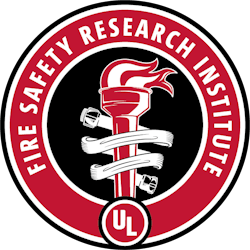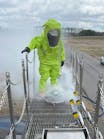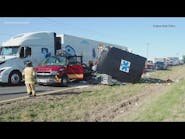UL Firefighter Safety Research Institute Rebrands to Fire Safety Research Institute
COLUMBIA, MD (July 29, 2021) – UL Firefighter Safety Research Institute (FSRI) today announced that they are expanding their focus to address fire safety more broadly and extending their collaborative model to actively engage fire investigators, fire safety engineers, academia, government, industry, safety educators and the general public, in addition to the fire service. In line with this expanded focus, their mission is evolving to holistically address the world’s unresolved fire safety risks and emerging dangers. To better reflect the expanded scope encompassing all areas of fire, the organization has evolved its name to UL’s Fire Safety Research Institute.
“While fire has not changed, the environment in which we live and fire occurs has,” said Steve Kerber, vice president of research and director, FSRI. “FSRI has been working to keep pace with that change, evolving our capabilities, research scope, and the stakeholder groups we engage to address fire safety more broadly. Our expanded focus extends to our team, our capabilities, our physical and digital footprints, and the topics we address. We’ve already begun expanding in all these areas and will continue as fire hazards continue to emerge.”
The scope of fire safety has changed due to new technologies, new household materials and layouts, and new environmental dynamics. FSRI’s evolution will encompass a more holistic research effort around fire safety, better positioning the organization to address these new fire challenges and identify solutions to help fulfill UL’s mission.
FSRI has historically focused on fire dynamics, fire service tactics and strategies in residential, commercial and industrial buildings through full-scale testing, field testing, modeling, and sharing information through online and classroom education. That work continues to be an important part of FSRI’s research and mission. The organization has begun extending beyond fire dynamics to examine factors affecting firefighter health and safety, to work with the fire investigation community, and to help fire and life safety educators share data-driven public fire safety education with their communities. They are also delving into expanded research topics such as wildland urban interface and materials decomposition.
“Everything we have done and will do continues to serve the pursuit of improving fire safety, advancing fire research knowledge, and educating stakeholders to more effectively protect people and property,” Kerber continued.
To learn more about FSRI’s expanded scope, research efforts, growing team and collaboration opportunities, please visit FSRI.org.
About Fire Safety Research Institute
UL’s Fire Safety Research Institute (FSRI) strives to advance fire safety knowledge and strategies in order to create safer environments. Using advanced fire science, rigorous research, extensive outreach and education in collaboration with an international network of partners, the organization imparts stakeholders with knowledge, tools, and resources that enable them to make better, more fire safe decisions that ultimately save lives and property. To learn more, visit fsri.org. Follow Fire Safety Research Institute on Twitter, Instagram and Facebook.
About Underwriters Laboratories
Underwriters Laboratories is a nonprofit organization dedicated to advancing the UL public safety mission through the discovery and application of scientific knowledge. We conduct rigorous independent research and analyze safety data, convene experts worldwide to address risks, share knowledge through safety education and public outreach initiatives, and develop standards to guide safe commercialization of evolving technologies. We foster communities of safety, from grassroots initiatives for neighborhoods to summits of world leaders. Our organization employs collaborative and scientific approaches with partners and stakeholders to drive innovation and progress toward improving safety, security, and sustainability, ultimately enhancing societal well-being. To learn more, visit UL.org.






